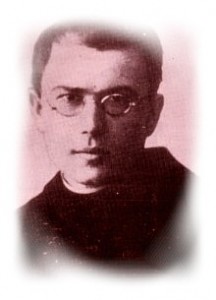Saint of the Day: St. Maximilian Kolbe – August 14
St. Maximilian Kolbe, a Conventual Franciscan, is widely known as the saint of the Nazi death camp Auschwitz, where he voluntered to take the place of a young husband and father who was one of ten innocent men condemned to death by starvation as a reprisal. As courageous as this was, he is also considered a martyr because of the abuse and torture he endured when he affirmed his faith in Christ.
Born Rajmund Kolbe (1894 – 1941), to a working class family in what is now Poland, he took the name of Maximilian when he entered the Conventual Franciscans. He had doctorates in philosophy and theology and founded a thriving monastery at Niepokalanow near Warsaw. St. Maximilian Kolbe was also a missionary to Japan and is remembered for his respect for Japanese culture and tradition as he created a thriving center near Nagasaki.
He lived a life of true Franciscan poverty, often living in very difficult circumstances, but always depending on God for the resources he needed for his apostolate. St. Maximilian Kolbe used publishing and radio to promote the Gospel and to defend the Church. He landed in Japan with a couple of companions and no money. They began their work sleeping on the ground in an improvised hut. Within a month he had a press and was publishing a weekly newspaper. He ventured into India where he wanted to create another foundation, but his superiors recalled him to Poland because of his ill health.
In 1939 the Nazis invaded Poland. St. Maximilian Kolbe and his fellow Franciscans sheltered 3,000 refugees at Niepokalanow including 2,000 Jews. On February 17, 1941 he was arrested by the Gestapo after publishing a defense of truth in the face of Nazi propaganda. In May he was transferred to Auschwitz, where he continued his ministry despite inhuman conditions and beatings. It was in late July that a prisoner from his cell block disappeared and he volunteered to take the place of one of the ten men selected to be executed as a reprisal for the missing prisoner. After three weeks of hunger and thirst, during which he encouraged the other men and led them in prayer, he was murdered by a lethal injection on August 14.
St. Maximilian Kolbe had a powerful effect on a young Polish man, Carol Wotyla, who as Pope John Paul II would declare him a saint.
St. Maximilian Kolbe has also inspired Operation Kolbe, a group in Colombia, to offer themselves in exchange for those who have been kidnapped by rebels. They can be reached at: operacionkolbe@hotmail.com.
Read More











